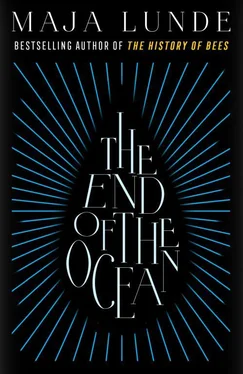There is a tunnel under the Channel; it’s inconceivable, every single hour hundreds of people travel by train beneath me, with millions of liters of water over their heads. To think that they dare make that journey, those who every day board a train and willingly and knowingly allow themselves to be transported under the seabed—there is no place more claustrophobic or tomb-like.
The mist grows heavier and heavier, clouds that love the land, Daddy said, he liked the fog, but the fog here… now… I get to my feet, my visibility is obscured, the sea evaporates before me, behind me, I can no longer see the sky.
It is dark, a peculiar gray darkness; I turn on the lanterns, but it doesn’t help much. I do it mostly just to have done it, use the fog horn; its faint howl is swallowed up by the air thick with moisture, one long and two short blasts, one long, two short.
But I know my position, I have the compass; if I just continue on exactly the same course, sounding the fog horn, I will be safe.
I cling to the helm, my knuckles whiten, my eyes on the compass needle. It is completely silent, like in a vacuum, like in outer space, the moisture in the air prevents the sound waves from traveling. I try the fog horn again, but the sound is so faint, almost nothing.
I keep going, on the same course, maintain a low speed, three knots—at this speed it will take several hours to pass the Strait of Dover, but I don’t dare try to go any faster.
And then I hear it, the engine of another boat… no, not a boat… the pounding, enormous engine of a ship.
I turn around.
Where is it coming from?
Just the same gray wall on all sides.
The ship draws closer, the sound grows louder, but where is it coming from? I turn my engine off, stand rigidly, my jacket makes a noise when I move, the material of the jacket squeaks, while the ship, the ship still doesn’t exist except as a pounding, heavy rumble, gradually, inexorably increasing in volume.
I listen, the sound is coming from the starboard side, I turn my head, no, it’s coming from the port side. My damn hearing, the right ear weaker than the left; I stood too close to a megaphone once, or maybe it was the angle grinder during the protest in Alta. Alta, yet another loss, they spent a day removing the chains. We thought we were going to win and in just one day they cut all the chains. But now I don’t need my hearing any longer, because now I can see the ship, it’s emerging, a huge, gray shadow, like a mountain right in front of me.
Heading straight for me, to my port side.
My fog horn screeches, one long, two short, again and again, but it is smothered by the sound of the big ship’s engine; they haven’t seen me, just keep going. I shift the helm forcibly, set the engine at full operating speed and…
There are just a few meters between me and the ship, I can glimpse the patches of rust on the side of the vessel, the weld seams in the steel construction.
He has presumably not seen me, the skipper up there on the bridge, he doesn’t know, will never know, that on this day he almost ran down a sixty-seven-year-old lone sailor from Norway.
But then he disappears again, then the ship disappears behind me and I think I can see it growing lighter, or perhaps it’s just white spots floating before my eyes, because now I finally remember to breathe again.
And I laugh, a loud laugh of relief.
The laughter carries actually, even through the fog, it carries and lingers.
I’m unstoppable, I think.
I am, and have always been, quite unstoppable.
Unstoppable.
Especially in the fight for Eidesdalen, infected with anger and with the child growing inside me. I remember how the anger grew along with it, how it burned and warmed me, became stronger with every passing day.
Unstoppable but not happy. There are people who live their entire lives with a glint in their eyes, they move slowly, walk securely through the world, able to take pleasure in a nice meal, an evening spent with good friends, a hike in the woods with people they care about. They collect such experiences, carry them inside to turn to when life turns against them, cling to them, use them to warm themselves on. I think this ability must be innate, genetic, like a talent for numbers or words.
But I was happy up there. I remember that I was happy. We set up camp at the end of the access road up in the mountains, 1,100 meters above sea level, where according to the plans the new dam was going to be built. But there would be no dam, no tunnel, no pipeline down to the power plant, we thought, because every day more demonstrators joined us, soon there were more than 500 of us, mostly young people, even some children joined us, because it was summertime and school was out and the children roamed about as if they were attending an unusual kind of summer camp.
The tents, all of them low mountain tents designed for conditions such as this, were scattered across a large, stony area. The weather was rough up there, so far above sea level, and it rained often, because the area was located where the clouds from the ocean met the mountains. But it made little difference to us. The days were long, there were many hours of daylight and we shared everything: food, coffee, cigarettes, stories and political engagement. We gathered around a huge bonfire in the evenings, filled the silence of the mountain with singing and reading letters and newspaper articles out loud. Everything that came to us, everything that was about us, we read. Every day we received declarations of support in the form of letters, newspapers and food, all of it airlifted to us by light aircraft. All these things were signals letting us know that we were being noticed, that we were taking part in something historic—never before had the Norwegian struggle to protect the environment found expression in a demonstration like this. And best of all, our protests were reverberating beyond the borders of Norway, because soon Swedish, Danish and even German newspapers were writing about the demonstration.
I have never felt as much at home anywhere as I did up there and I hoped it would last forever. But the memories didn’t turn into something I could warm myself on, because soon it would all come to an end, along with the rest of my life as I knew it.
The beginning of the end… that was perhaps the morning when the sheriff from Ringfjorden arrived. He had been hired just a couple of years ago, so neither Magnus nor I knew him, a young guy with a Stavanger dialect. He had with him three men and a megaphone, through which he stammered his prepared statement.
He asked us to leave, was heartfelt, earnest, speaking without anger; he made reference to the penal code, which he claimed we were all violating and that we were at risk of being fined or even being put in jail.
“You are hereby ordered to evacuate the area immediately so the work can continue.”
I squeezed Magnus’s hand.
“Forget it,” I said softly to him and to myself.
Because we stayed, of course we stayed, we were going to remain here until they had to carry us away.
But the sheriff continued: “You have communicated what you wished to communicate, you have achieved what you wanted to achieve.”
“What language,” I said.
“I thought you liked it when people expressed themselves correctly,” Magnus said.
Daddy stepped forward, smiled at the sheriff.
“We understand that you’re here because you have no choice,” he said. “But you only represent Ringfjorden… I don’t see the sheriff from Eidesdalen up here…”
“I don’t see many people from Eidesdalen either,” the sheriff said.
“They have farms to run,” Daddy said. “And we’re not just here for them. We’re here for the environment, for the water ouzel, for the freshwater pearl mussels.”
Читать дальше










